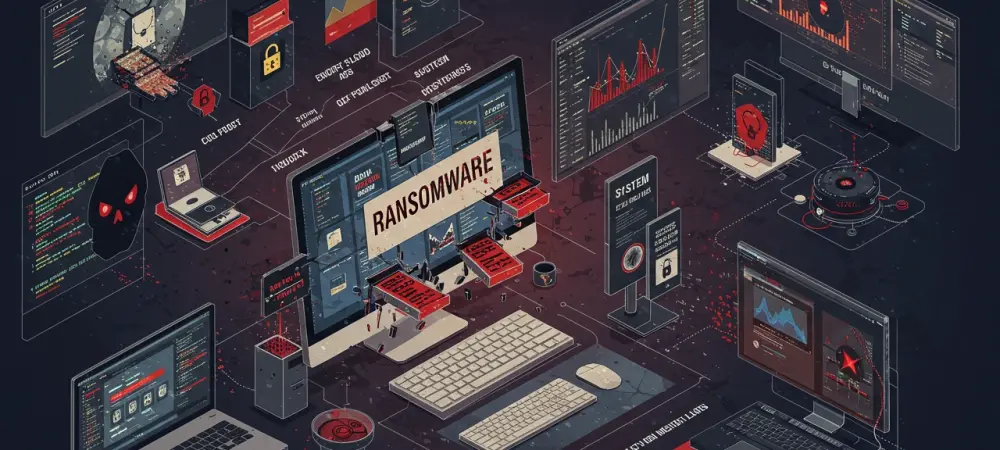The cyber realm has grown increasingly perilous as one of the most notorious threats, Anubis ransomware, continues to evolve and escalate its strategies to endanger data security. Recently, a new destructive capability has emerged, adding a devastating layer to its arsenal: file-wiping tactics that permanently obliterate any encrypted files. This escalation dramatically elevates the risk factors involved in ransomware attacks, challenging both businesses and individuals. As part of the burgeoning Ransomware-as-a-Service (RaaS) industry, Anubis exemplifies the sophisticated tactics that cybercriminals now employ to amplify their effects and coerce compliance during ransom negotiations. This innovation underscores the looming necessity for entities to fortify their cybersecurity measures and adopt more comprehensive defenses against such aggressive threats.
Unveiling Anubis’s File-Wiping Tactics
Heightened Pressure on Victims
Anubis’s introduction of a file-wiping feature transforms typical ransomware attacks into far more threatening scenarios. Traditionally, ransomware victims endure encryption of sensitive data and are forced into negotiations for decryption keys. However, Anubis’s fresh approach of permanently eradicating files intensifies this pressure, leaving victims helpless in negotiations. Reports and analyses by security researchers, like those from Trend Micro, highlight that this new tactic places victims in precarious positions, driving them to comply out of sheer desperation. Such pressure could lead to devastating consequences, including legal troubles, devaluation of trust among clients, and a competitive disadvantage for businesses that fail to resolve the breach swiftly and effectively.
Diversifying Threat Tactics
The technological advances exhibited by Anubis are not restricted only to file wiping. This ransomware reveals its willingness to diversify tactics by leveraging additional methods of intimidation such as Distributed Denial-of-Service (DDoS) attacks and direct, threatening phone calls to victims. By employing multiple strategies, Anubis exacerbates the victim’s situation, effectively cornering them into submission. This multifaceted approach marks a significant shift in the cybercriminal landscape, where attackers broaden their modus operandi to exploit vulnerabilities. These strategies only emphasize the critical need for businesses to remain vigilant and adaptive in their cybersecurity strategies if they are to withstand the growing complexity of cyber threats.
Strategies for Ransomware Defense
Importance of Security Measures
To confront the intensified risks posed by Anubis and similar ransomware entities, businesses must prioritize implementing robust security measures. It has become essential that entities incorporate advanced defenses, including efficient firewall configurations, real-time network monitoring tools, and intrusion detection systems to identify potential breaches early. Moreover, enabling user authentication systems adds an additional layer of protection, securing access to sensitive data. Organizations should strive to establish air-gapped, secure backups that ensure uninterrupted file recovery without relying solely on decryption keys that might not be accessible. Empowering the technical infrastructure with these measures is vital for safeguarding sensitive data against permanent destruction.
Regular Updates and Backup Protocols
Regular updates play a pivotal role in maintaining an effective defense against ransomware. Cybercriminals continually refine their strategies to exploit outdated systems; therefore, consistent software updates and patching must be a priority. Backing up important files in multiple formats and locations should form a centerpiece of proactive cybersecurity measures. In the event of ransomware execution, backed-up data facilitates recovery without indulging attackers’ demands. By adopting a routine of systematic reviews and updates, as well as consistent backup protocols, entities can significantly mitigate vulnerabilities that lead to severe organizational impacts.
Concluding Insights and Future Considerations
Anubis’s capability to wipe files takes standard ransomware attacks to a new level of threat. Traditionally, ransomware targets find their data encrypted and are cornered into bargaining for the keys to unlock their files. This new strategy by Anubis introduces a fresh kind of menace by completely destroying files, which adds a whole new layer of pressure on victims. No longer just facing encryption, they’re watching their data vanish, which makes negotiating harder. Anubis’s tactics have been analyzed by security experts like those from Trend Micro, and they stress that this drastic move leaves victims with no other option but compliance, driven by sheer desperation. Consequently, organizations hit by this might face severe setbacks. They could end up grappling with legal issues, a loss of clients’ trust, and a weakened competitive stance in the market. These potential repercussions emphasize the critical need for businesses to manage breaches swiftly and effectively to mitigate adverse outcomes and restore digital security.

